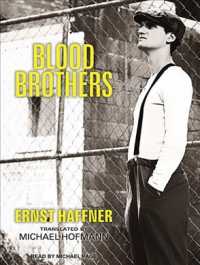Full Description
FÚtbol, or soccer as it is called in the United States, is the most popular sport in the world. Millions of people schedule their lives and build identities around it. The World Cup tournament, played every four years, draws an audience of more than a billion people and provides a global platform for displays of athletic prowess, nationalist rhetoric, and commercial advertising. FÚtbol is ubiquitous in Latin America, yet few academic histories of the sport exist, and even fewer focus on its relevance to politics in the region. To fill that gap, this book uses amateur fÚtbol clubs in Chile to understand the history of civic associations, popular culture, and politics.
In Citizens and Sportsmen, Brenda Elsey argues that fÚtbol clubs integrated working-class men into urban politics, connected them to parties, and served as venues of political critique. In this way, they contributed to the democratization of the public sphere. Elsey shows how club members debated ideas about class, ethnic, and gender identities, and also how their belief in the uniquely democratic nature of Chile energized state institutions even as it led members to criticize those very institutions. Furthermore, she reveals how fÚtbol clubs created rituals, narratives, and symbols that legitimated workers' claims to political subjectivity. Her case study demonstrates that the relationship between formal and informal politics is essential to fostering civic engagement and supporting democratic practices.
Contents
Acknowledgments
Introduction
Chapter One. Rayando la Cancha-Marking the Field: Chilean Football, 1893-1919
Chapter Two. The Massive, Modern, and Marginalized in Football of the 1920s
Chapter Three. "The White Elephant": The National Stadium, Populism, and the Popular Front, 1933-1942
Chapter Four. The "Latin Lions" and the "Dogs of Constantinople": Immigrant Clubs, Ethnicity, and Racial Hierarchies in Football, 1920-1953
Chapter Five. "Because We Have Nothing . . .": The Radicalization of Amateurs and the World Cup of 1962
Chapter Six. The New Left, Popular Unity, and Football, 1963-1973
Epilogue
Notes
Bibliography
Index







